10.04.2018
GICJ’s Written Statements
GICJ jointly submitted 17 Written Statements with several signatories to the 37th Regular Session of the Human Rights Council. The most concerning and pressing issues and situations on human rights violations and abuses were addressed; Burundi, Libya, Iraq, Myanmar, Palestine, South Sudan, Syrian Arabic Republic, and Yemen were the regions of focus. Each statement concludes with recommendations that GICJ and signing NGOs wish to address to the UN bodies and in particular to the Human Rights Council and its Member States.
"Democratic Space, Civil Society and Political Crisis in Burundi"
The democratic space in Burundi has continuously shrunk since 2013 and the political crisis has continued to worsen. Since Burundian President Pierre Nkurunziza in 2015 took a third term in office Burundi fell into political and civil turmoil that escalated to serious human rights abuses and violations. In addition, the current government of Burundi has left several critical international bodies such as the Rome Statute of the International Criminal Court and has weakened its cooperation with the Human Rights Council in so far as denying the Commission of Inquiry on Human Rights in Burundi access into the country. 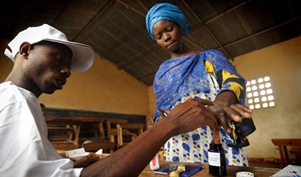 The current government has also taken several legal and non-legal steps to silence any opposition especially by the media. This statement condemns such actions by the very authorities that are supposed to protect a democratic and civil society to freely express their opinions in a non-violent manner. Moreover, similar legal and non-legal measures were taken to prevent civilians’ right to freedom of assembly and association. These actions have led to escalated violence including detentions, and even reports of enforced disappearances and torture particularly towards journalists. This statement also gives recommendations to the Human Rights Council and the government of Burundi towards improving democratic and civic space in Burundi.
The current government has also taken several legal and non-legal steps to silence any opposition especially by the media. This statement condemns such actions by the very authorities that are supposed to protect a democratic and civil society to freely express their opinions in a non-violent manner. Moreover, similar legal and non-legal measures were taken to prevent civilians’ right to freedom of assembly and association. These actions have led to escalated violence including detentions, and even reports of enforced disappearances and torture particularly towards journalists. This statement also gives recommendations to the Human Rights Council and the government of Burundi towards improving democratic and civic space in Burundi.
Link to full Written Statement
"Libya – Human Trafficking and Slavery"
On 14th of November 2017, United Nations High Commissioner for Human Rights, Mr. Zeid Ra’ad Al-Hussein, expressed deep dismay regarding the appalling conditions of detention facilities in Libya. Additionally, he expressed concern over the plight of African migrants detained in these facilities further noting that the detention system in Libya is “broken beyond repair”. 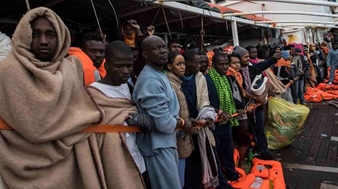 On 20 November 2017, United Nations Secretary General, António Guterres spoke to reporters expressing his horror regarding news reports that showed alleged human slavery at an auction in Libya. The victims are African migrants who were captured, trafficked, and/or tricked into slavery.
On 20 November 2017, United Nations Secretary General, António Guterres spoke to reporters expressing his horror regarding news reports that showed alleged human slavery at an auction in Libya. The victims are African migrants who were captured, trafficked, and/or tricked into slavery.
This statement emphasises the need to address the root causes of the human slave auctions in Libya including a serious investigation by a specialized UN mission guided by the UN Human Rights Council. Respect, dignity, and security for the human rights of African migrants en route to and under captivity in Libya must be protected. This statement also gives alternatives to detention and looks into international norms and customs on slavery, notable responses that warrant tackling root causes, and recommendations for the Human Rights Council, the African Union, and the European Union.
Link to full Written Statement
"United Nations Response to Iraq’s Humanitarian Crisis"
Iraq is being swept off the Earth by the hurricane of wars. The past decade is not an exception. The US-led invasion in 2003 led to increased armed violence and worsening of the situation in Iraq. The security environment in the country is deteriorating day by day. Continuous armed conflict had a negative impact on every person and every aspect of life within the Iraqi society. Serious widespread and systematic human rights violations are reported in the conduct of armed groups, the U.S.-led coalition forces and the Iraqi government. Sectarianism and the danger of disintegration remain. Terrorism and criminal violence have become part of daily life in many parts of the country. 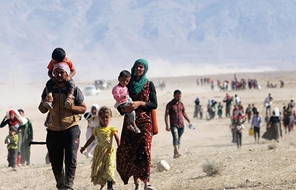 Furthermore, the collateral damage of the fight against the Islamic State of Iraq and the Levant (ISIL, also known as ISIS) is simply ignored. The given statement states that the commissioned war crimes, crimes against humanity and genocide are not investigated, the perpetrators enjoy impunity and fear nothing, victims are denied their right to remedy and reparation. These horrendous large-scale systematic human rights violations were and are being committed by the Iraqi governmental agents, security and military forces, government-allied militias, coalition military forces, ISIS and other non-state armed groups in Iraq. These widespread and systematic crimes could be qualified as international crimes set forth by the Rome Statute of the International Criminal Court. Lastly, this written statement concludes that the international community’s response to the Iraqi crisis through the United Nations and the impact on the ground are not efficient.
Furthermore, the collateral damage of the fight against the Islamic State of Iraq and the Levant (ISIL, also known as ISIS) is simply ignored. The given statement states that the commissioned war crimes, crimes against humanity and genocide are not investigated, the perpetrators enjoy impunity and fear nothing, victims are denied their right to remedy and reparation. These horrendous large-scale systematic human rights violations were and are being committed by the Iraqi governmental agents, security and military forces, government-allied militias, coalition military forces, ISIS and other non-state armed groups in Iraq. These widespread and systematic crimes could be qualified as international crimes set forth by the Rome Statute of the International Criminal Court. Lastly, this written statement concludes that the international community’s response to the Iraqi crisis through the United Nations and the impact on the ground are not efficient.
Link to full Written Statement
"Fighting terrorism in Iraq"
Fifteen years after the invasion in Iraq, the so-called “war on terror” has led to severe numbers of Iraqi casualties, both civilian and combat troops, as a consequence of the indiscriminate and brutal ways in which this war has been and is being fought. The Iraqi security forces and militias are committing brutal abuses and are ultimately contributing to 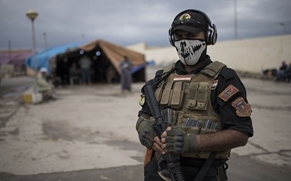 an already very poor human rights situation. These abuses, in combination with anti-terrorism measures built into Iraqi law, and extreme war tactics are responsible for a broad array of human rights violations. We recommended to the UN to investigate the legality and application of the Iraqi Anti-Terrorism Law and to establish an independent investigation committee to ensure accountability of all parties to the conflict that committed widespread and massive violations of international humanitarian and human rights law.
an already very poor human rights situation. These abuses, in combination with anti-terrorism measures built into Iraqi law, and extreme war tactics are responsible for a broad array of human rights violations. We recommended to the UN to investigate the legality and application of the Iraqi Anti-Terrorism Law and to establish an independent investigation committee to ensure accountability of all parties to the conflict that committed widespread and massive violations of international humanitarian and human rights law.
"Children and Armed Conflict in Iraq"
The so-called ‘war on terror’ in Iraq is conducted in indiscriminate and brutal ways. The imperative of the Iraqi government, supported by the pro-governmental militias and international coalitions, 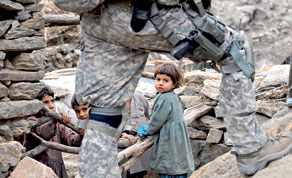 worsens the situation on the ground by allowing security forces and militias to commit brutal abuses. As always, civilians are disproportionately affected by the conflict. Moreover, in Iraq children have a lot to endure. We recommend to the UN to prosecute perpetrators of violations against children and to allocate the adequate resources to reintegrate children, with specific attention to psychological support. Further we urged the UN Office in Iraq to investigate the recruitment of children for training camps organized by the various parties to the conflict.
worsens the situation on the ground by allowing security forces and militias to commit brutal abuses. As always, civilians are disproportionately affected by the conflict. Moreover, in Iraq children have a lot to endure. We recommend to the UN to prosecute perpetrators of violations against children and to allocate the adequate resources to reintegrate children, with specific attention to psychological support. Further we urged the UN Office in Iraq to investigate the recruitment of children for training camps organized by the various parties to the conflict.
Link to full written statement
"Mosul: Rebuilding after Destruction and Bringing Accountability"
Months after the end of the so-called “liberation” campaign conducted by Iraqi forces with the support of the international coalition that was led by the United States of America, many civilians in Mosul, Iraq are still under the threat of Iraqi Security Forces (ISF) as well as the Iraqi Federal Police. Reports allege that civilians are being indiscriminately abducted under the suspicion that they may have been with or had ties with ISIS. As well, innocent 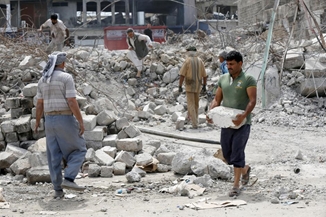 civilians who have, or had relatives associated with ISIS are also under threat. The paramilitaries, primarily the Popular Mobilization Forces (PMF) who are mostly backed by Iran, also committed grave violations under the pretext of liberating Mosul. Mosul is in desperate need of humanitarian assistance to restore stability, security, and peace. This statement looks at steps towards moving forward and the barriers it entails as well as accountability of perpetrators and ensuring justice for victims. It also touches on the role of civil society and their relationship with the government.
civilians who have, or had relatives associated with ISIS are also under threat. The paramilitaries, primarily the Popular Mobilization Forces (PMF) who are mostly backed by Iran, also committed grave violations under the pretext of liberating Mosul. Mosul is in desperate need of humanitarian assistance to restore stability, security, and peace. This statement looks at steps towards moving forward and the barriers it entails as well as accountability of perpetrators and ensuring justice for victims. It also touches on the role of civil society and their relationship with the government.
Link to full Written Statement
"War Crimes Committed During the War and Occupation of Iraq"
This statement focuses on violations of international law during the Iraq War and occupation, and in particular, war crimes committed by the United States of America and its allies (hereinafter, the “Coalition”).1 The extent of Coalition war crimes warrants the establishment of an independent international tribunal that can investigate and prosecute such crimes. In an international armed conflict3 like the initial Iraq War, war crimes include all grave breaches of the Geneva Conventions, including: wilful killing, torture or inhuman treatment, unlawful detention, deportation or transfer of a civilian, denying civilians or prisoners of war of fair trial rights, hostage-taking, and wanton 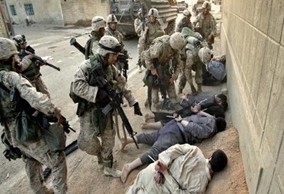 destruction of and appropriation of property. An independent international tribunal for Iraq would strengthen international humanitarian law, provide victims an opportunity to voice the horrors they witnessed and experienced, would bring justice to the persons responsible for them, and would contribute to restoring and maintaining peace.
destruction of and appropriation of property. An independent international tribunal for Iraq would strengthen international humanitarian law, provide victims an opportunity to voice the horrors they witnessed and experienced, would bring justice to the persons responsible for them, and would contribute to restoring and maintaining peace.
Link to full Written Statement
"Holding the United States-Led Coalition that Invaded Iraq Responsible for the Crime of Aggression"
This statement focuses on the troubling lack of accountability for the crime of aggression committed through the invasion of the Republic of Iraq in March 2003 by the United States of America. The failure to hold former government leaders accountable for this invasion is a grave threat to international law. 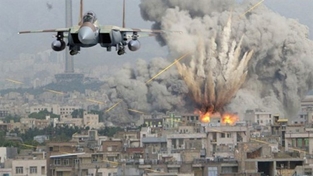 Like previous international criminal tribunals, an independent international criminal tribunal for the crimes committed in the lead up to the Iraq War will further the cause of justice, enforce and uphold the rule of law, and further international accountability. Initially prosecuted on an international level before the Nuremberg Tribunal, the crime of aggression is the supreme international crime. Starting on July 17, 2018, the International Criminal Court (ICC) can narrowly prosecute crimes of aggression, making it the first time since the Nuremberg Tribunal that an international court will be able to prosecute this crime. To date, there has only been one attempt to investigate the issue of aggression in Iraq. No other serious attempts to investigate the Iraq War and the issue of aggression have been made in the United States or elsewhere.
Like previous international criminal tribunals, an independent international criminal tribunal for the crimes committed in the lead up to the Iraq War will further the cause of justice, enforce and uphold the rule of law, and further international accountability. Initially prosecuted on an international level before the Nuremberg Tribunal, the crime of aggression is the supreme international crime. Starting on July 17, 2018, the International Criminal Court (ICC) can narrowly prosecute crimes of aggression, making it the first time since the Nuremberg Tribunal that an international court will be able to prosecute this crime. To date, there has only been one attempt to investigate the issue of aggression in Iraq. No other serious attempts to investigate the Iraq War and the issue of aggression have been made in the United States or elsewhere.
Link to full Written Statement
"No Safe Haven: Palestinian Children under Israeli Military Occupation"
This statement highlights that Palestinian children are among those whose most fundamental rights are violated on a consistent basis, as a result of Israel’s prolonged belligerent occupation. This 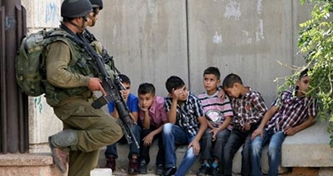 statement focuses on the most fundamental of rights, namely the right to life and safety, which continues to be infringed upon due to Israel’s daily military activities and settler violence, as well as due to destructive military campaigns. These have a cumulative effect on children, often leaving those that survive with lifelong injuries and psychological illnesses. The statement therefore recommends the international community to demand Israeli authorities to abide scrupulously by the State’s obligations under the CRC in all territories under its control and to comply with the Fourth Geneva Convention.
statement focuses on the most fundamental of rights, namely the right to life and safety, which continues to be infringed upon due to Israel’s daily military activities and settler violence, as well as due to destructive military campaigns. These have a cumulative effect on children, often leaving those that survive with lifelong injuries and psychological illnesses. The statement therefore recommends the international community to demand Israeli authorities to abide scrupulously by the State’s obligations under the CRC in all territories under its control and to comply with the Fourth Geneva Convention.
Link to full Written Statement
"Born into Injustice: The Impact of Institutionalized Discrimination on Palestinian Children"
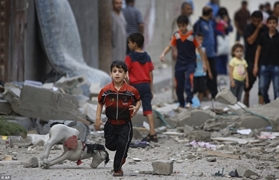 In this statement, it is outlined that Palestinian children fall victim to a system that discriminates against them on the basis of their national belonging from the very day they are born. Palestinian children fall victim to a discriminatory system, under which fundamental rights such as a healthy upbringing in a stable home and family environment are gravely obstructed. Having discussed the detrimental impact on their right to home, family life, and residency; deprivation of liberty; and the right to health, the statement stresses that the full enjoyment of Palestinian children of their human rights will only be possible if Israel’s occupation and institutionalized discrimination against Palestinians is brought to an end.
In this statement, it is outlined that Palestinian children fall victim to a system that discriminates against them on the basis of their national belonging from the very day they are born. Palestinian children fall victim to a discriminatory system, under which fundamental rights such as a healthy upbringing in a stable home and family environment are gravely obstructed. Having discussed the detrimental impact on their right to home, family life, and residency; deprivation of liberty; and the right to health, the statement stresses that the full enjoyment of Palestinian children of their human rights will only be possible if Israel’s occupation and institutionalized discrimination against Palestinians is brought to an end.
Link to full Written Statement
"Obstruction of Human Rights: US Recognition of Jerusalem as Capital of Israel"
The statement affirms that, whereas the US decision to officially recognize Jerusalem as capital of Israel can be viewed as attempt to legitimize Israeli control over the remaining Palestinian territory 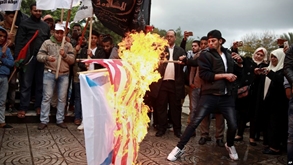 and to undermine Palestinians’ legitimate historic, national, and legal rights in Jerusalem, it does not change the internationally recognized status of Jerusalem, according to which East Jerusalem is illegally occupied and is the future capital of Palestine. Having outlined in what ways the US move further deprives Palestinians of their inalienable rights, the statement reaffirms in the strongest manner that the UN must take all necessary measures to pressure the US to rescind its decision and to finally bring an end to the illegal Israeli occupation.
and to undermine Palestinians’ legitimate historic, national, and legal rights in Jerusalem, it does not change the internationally recognized status of Jerusalem, according to which East Jerusalem is illegally occupied and is the future capital of Palestine. Having outlined in what ways the US move further deprives Palestinians of their inalienable rights, the statement reaffirms in the strongest manner that the UN must take all necessary measures to pressure the US to rescind its decision and to finally bring an end to the illegal Israeli occupation.
Link to full Written Statement
"Exploitation and Control of Palestinian Natural Resources as Tools of Domination"
The statement recalls that numerous UN resolutions reaffirm permanent sovereignty by the Palestinian people over their natural resources, which is an essential element in the right of self-determination. 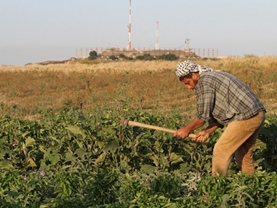 However, Palestinian sovereignty is undermined by Israel’s exploitation, damage and depletion of their natural resources, destruction of agricultural lands and orchards, and destruction, forced diversion or seizure of vital infrastructure such as water, sewage and electricity systems, and dumping of waste materials. Such activities exacerbate the already critical socioeconomic and human rights situation of Palestinians. Natural resources are described as another tool to dominate and dehumanize Palestinians and to further undermine their prospects for self-determination. Therefore, the statement recommends to the relevant UN bodies to, inter alia, pressure Israel to end its policies of illegal appropriation and exploitation of Palestinian natural resources.
However, Palestinian sovereignty is undermined by Israel’s exploitation, damage and depletion of their natural resources, destruction of agricultural lands and orchards, and destruction, forced diversion or seizure of vital infrastructure such as water, sewage and electricity systems, and dumping of waste materials. Such activities exacerbate the already critical socioeconomic and human rights situation of Palestinians. Natural resources are described as another tool to dominate and dehumanize Palestinians and to further undermine their prospects for self-determination. Therefore, the statement recommends to the relevant UN bodies to, inter alia, pressure Israel to end its policies of illegal appropriation and exploitation of Palestinian natural resources.
Link to full Written Statement
"Forcible Repatriation of Rohingya: Disregard to the International Prohibition of Refoulment"
The situation of Rohingya Muslim minority of Myanmar remains increasingly alarming. The mass atrocities against Rohingya continue to these days despite the international calls for immediate halt of violence. As a result of army crackdowns in Myanmar’s northern Rakhine state in 2016 and 2017, approximately 750,000 Rohingya fled to Bangladesh. The atrocity crimes committed against Rohingya with an obvious intent to destroy this group may amount to the international crime of genocide.  On 16 November 2017, the governments of Bangladesh and Myanmar signed repatriation agreement, according to which nearly 1 million Rohingya refugees in Bangladesh will be repatriated back within 2 years. This written statement insists that the repatriation deal between Bangladesh and Myanmar is extremely immature and we are convinced that it will bring to more human rights violations against Rohingya minority. The main condition that must be met before any repatriation plan is implemented - an unconditional end to the violence and guarantees of non-recurrence. Moreover, refugees and international agencies, including UN, are excluded from all stages of this repatriation. Rohingya should play a key role in planning and management of their return. Lastly, the statement reminds of previous unfortunate repatriations of tens of thousands Rohingya to Myanmar in the 1990s and early 2000s.
On 16 November 2017, the governments of Bangladesh and Myanmar signed repatriation agreement, according to which nearly 1 million Rohingya refugees in Bangladesh will be repatriated back within 2 years. This written statement insists that the repatriation deal between Bangladesh and Myanmar is extremely immature and we are convinced that it will bring to more human rights violations against Rohingya minority. The main condition that must be met before any repatriation plan is implemented - an unconditional end to the violence and guarantees of non-recurrence. Moreover, refugees and international agencies, including UN, are excluded from all stages of this repatriation. Rohingya should play a key role in planning and management of their return. Lastly, the statement reminds of previous unfortunate repatriations of tens of thousands Rohingya to Myanmar in the 1990s and early 2000s.
Link to full Written Statement
"South Sudan: The Urgent Need to Resolve the Current Conflict"
In South Sudan the Sudan People’s Liberation Army (SPLA) and the Sudan People’s Liberation Army in-Opposition (SPLA-IO) remain in conflict and continue to commit grave human rights violations against innocent civilians. United Nations reports and press releases have indicated that the atrocities committed may amount to crimes against humanity as it has even been reported that humanitarian camps, including UN camps, have been under attack by soldiers who also seize humanitarian aid and at times abduct residents from the camp. 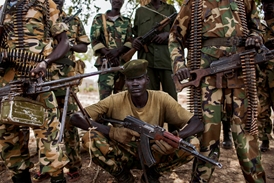 While it appears that the government is taking positive steps to alleviate the human rights violations committed, mainly by soldiers, such as the recent introduction of registering SPLA soldiers into a biometric system1, much more needs to be done to bring justice, healing and reconciliation to the victims.
While it appears that the government is taking positive steps to alleviate the human rights violations committed, mainly by soldiers, such as the recent introduction of registering SPLA soldiers into a biometric system1, much more needs to be done to bring justice, healing and reconciliation to the victims.
This statement looks into the humanitarian situation of children and the youth, witness testimony of victims who experienced or fled the conflict, and the environment of impunity with regards to the violent conflict situation in South Sudan. Lastly, this statement gives recommendations on technical assistance and capacity building towards improving the current situation in South Sudan and steps towards accountability and justice.
Link to full Written Statement
"Attacks on Public Health Workers in the Syrian Arab Republic"
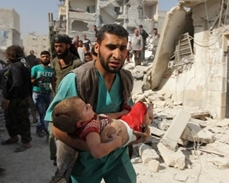 What began as anti-government protests in Syria’s capital, Damascus, in March 2011 has spiralled into a devastating civil war. Since the beginning of the war, an estimated 400,000 Syrians are reportedly dead or missing according to the United Nations and Arab League Envoy to Syria, over 5 million Syrians have fled the country and 12 million people are displaced internally. Over time, the conflict grew more and more complex with the involvement of the international community, Kurdish forces, terrorist organizations like ISIS and other opposition forces. According to the WHO, Syria is among the most dangerous countries for a health worker. Since the beginning of the conflict, 770 health care workers have been killed in Syria. During the same period, 147 humanitarian aid workers have been killed. Not only is this a grave loss of innocent lives, it also prohibits those in need of medical attention from receiving proper care.
What began as anti-government protests in Syria’s capital, Damascus, in March 2011 has spiralled into a devastating civil war. Since the beginning of the war, an estimated 400,000 Syrians are reportedly dead or missing according to the United Nations and Arab League Envoy to Syria, over 5 million Syrians have fled the country and 12 million people are displaced internally. Over time, the conflict grew more and more complex with the involvement of the international community, Kurdish forces, terrorist organizations like ISIS and other opposition forces. According to the WHO, Syria is among the most dangerous countries for a health worker. Since the beginning of the conflict, 770 health care workers have been killed in Syria. During the same period, 147 humanitarian aid workers have been killed. Not only is this a grave loss of innocent lives, it also prohibits those in need of medical attention from receiving proper care.
Link to full Written Statement
"Syria: UN Response to the Crisis"
The confrontation between the government and armed groups in Syria resulted in complex civil conflict with involvement of regional and world powers, the ISIS taking the advantage of the chaotic situation. It is estimated that more than half a million killed out of total population of 24,5 million 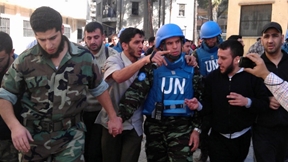 since the beginning of the Syrian humanitarian crisis in March of 2011. In 2017, the Humanitarian Response Team of Whole Syria assessed that 13.5 million people require humanitarian assistance, including 4.9 million people in need, trapped in besieged and hard-to-reach areas, where they are exposed to grave protection threats. Over half of the population has been forced from their homes, and many people have been displaced multiple times. Children and youth, millions of whom have known nothing but conflict, comprise more than half of the displaced, as well as half of those in need of humanitarian assistance. Horrendous large-scale systematic human rights violations were and are being committed by the governmental forces, coalition military forces, ISIS and other non-state armed groups. These widespread and systematic crimes could be qualified as international crimes set forth by the Rome Statute of the International Criminal Court. This statement aims to demonstrate the response of the international community to the Syrian crisis through the United Nations and assess the impact on the ground and advocates for more effective UN actions to alleviate the suffering and to protect civilians.
since the beginning of the Syrian humanitarian crisis in March of 2011. In 2017, the Humanitarian Response Team of Whole Syria assessed that 13.5 million people require humanitarian assistance, including 4.9 million people in need, trapped in besieged and hard-to-reach areas, where they are exposed to grave protection threats. Over half of the population has been forced from their homes, and many people have been displaced multiple times. Children and youth, millions of whom have known nothing but conflict, comprise more than half of the displaced, as well as half of those in need of humanitarian assistance. Horrendous large-scale systematic human rights violations were and are being committed by the governmental forces, coalition military forces, ISIS and other non-state armed groups. These widespread and systematic crimes could be qualified as international crimes set forth by the Rome Statute of the International Criminal Court. This statement aims to demonstrate the response of the international community to the Syrian crisis through the United Nations and assess the impact on the ground and advocates for more effective UN actions to alleviate the suffering and to protect civilians.
Link to full Written Statement
"Yemen: The Failure to Protect"
This statement aims to demonstrate the response of the international community to the Yemeni crisis through the United Nations and assess the impact on the ground and advocates for more effective UN actions to alleviate the suffering and protect civilians. The transition process after the coup d’état in Yemen prompted the fully-fledged civil war that continues to these days. The armed conflict further fuels sectarian divide in the region and destabilises war-torn Middle East. 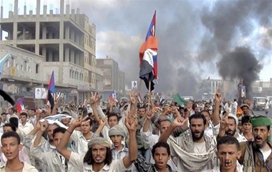 The Houthi forces allied with the former president Ali Abdullah Saleh are fighting the forces loyal to the government of Abdrabbuh Mansur Hadi. It is clear that Iran provides political, financial and military support to Houthis. The Iranian Quds Forces serve as military advisers, provide with arms and train the Houthi militia. The Saudi-led coalition in support to the President Hadi conducts a multinational military intervention against Houthis. All parties to the conflict in Yemen are well-aware of widespread and systematic attack. Grave violations of the provisions of 1948 Geneva Conventions by armed groups, Houthis and the Saud-led armed forces fulfil the elements of crimes against humanity and war crimes as defined by the Rome Statute of the International Criminal Court. The statement emphasises that perpetrators that violate the provisions of international human rights law and international humanitarian law should be brought to justice. The commissioned war crimes and crimes against humanity should be investigated in a prompt, thorough and independent manner. The statement concludes that the actions of the international community through the United Nations fail to protect civilians.
The Houthi forces allied with the former president Ali Abdullah Saleh are fighting the forces loyal to the government of Abdrabbuh Mansur Hadi. It is clear that Iran provides political, financial and military support to Houthis. The Iranian Quds Forces serve as military advisers, provide with arms and train the Houthi militia. The Saudi-led coalition in support to the President Hadi conducts a multinational military intervention against Houthis. All parties to the conflict in Yemen are well-aware of widespread and systematic attack. Grave violations of the provisions of 1948 Geneva Conventions by armed groups, Houthis and the Saud-led armed forces fulfil the elements of crimes against humanity and war crimes as defined by the Rome Statute of the International Criminal Court. The statement emphasises that perpetrators that violate the provisions of international human rights law and international humanitarian law should be brought to justice. The commissioned war crimes and crimes against humanity should be investigated in a prompt, thorough and independent manner. The statement concludes that the actions of the international community through the United Nations fail to protect civilians.
Link to full Written Statement
"Yemen: Women and Girls in Conflict"
Yemenis have been experiencing an ongoing civil war since 2014 when the Houthis, an anti-government force, took control of the city of Sana’a. This fight became international with the 2015 intervention by the Saudi-led coalition. The conflict has quickly escalated into an extremely dire 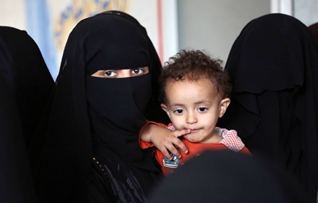 humanitarian crisis and in December 2017, it reached 1000 days of civil war. During these years of war, the Yemeni population has been witnessing multiple grave human rights violations, such as enforced displacements, enforced disappearances, abductions, indiscriminate killings and attacks on civilians. In this context, the statement considers discrimination against women and human rights violations, international human rights and humanitarian law, the right to education, the right to healthcare, and child marriage.
humanitarian crisis and in December 2017, it reached 1000 days of civil war. During these years of war, the Yemeni population has been witnessing multiple grave human rights violations, such as enforced displacements, enforced disappearances, abductions, indiscriminate killings and attacks on civilians. In this context, the statement considers discrimination against women and human rights violations, international human rights and humanitarian law, the right to education, the right to healthcare, and child marriage.
Link to full Written Statement




